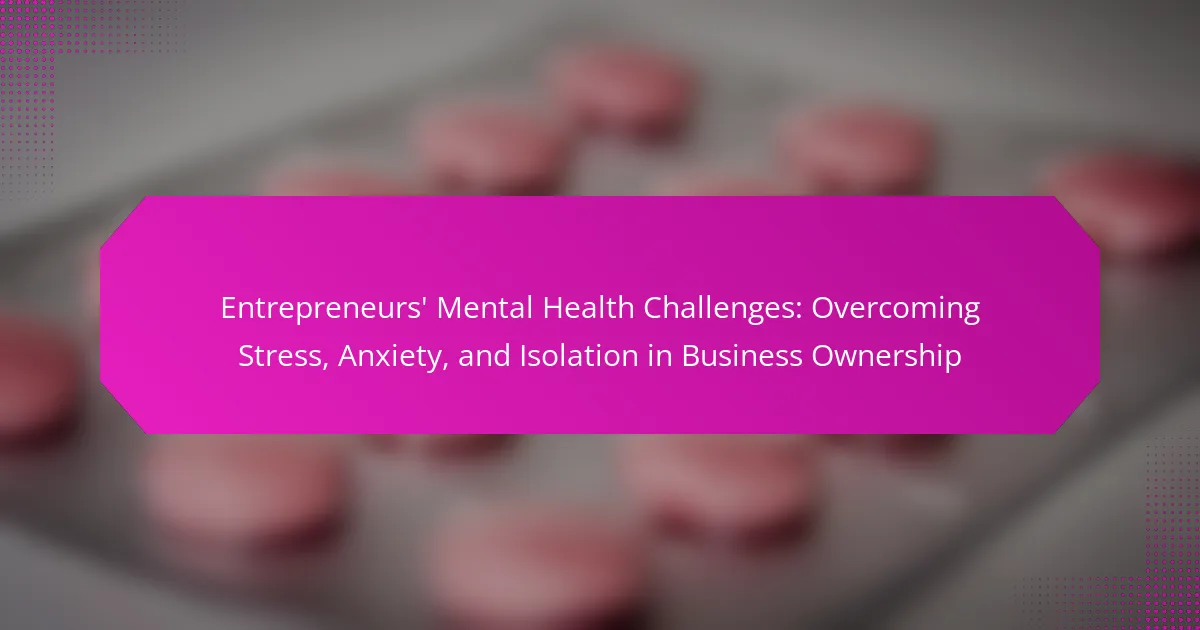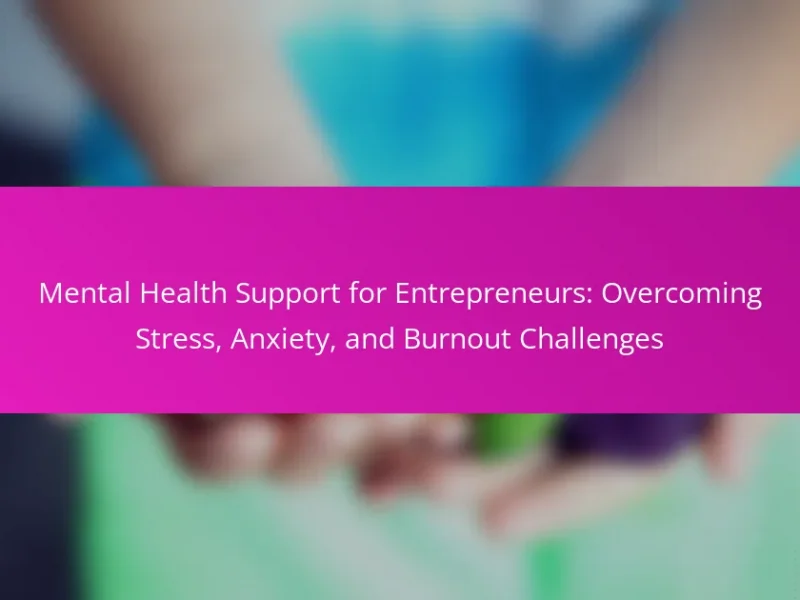Entrepreneurs often grapple with mental health challenges, including stress, anxiety, and isolation. These issues arise from the demanding nature of business ownership, such as financial uncertainties and long hours. Addressing these challenges involves implementing proactive strategies, seeking professional help, and building supportive networks. Prioritising mental health is essential for enhancing resilience and achieving sustainable business success.
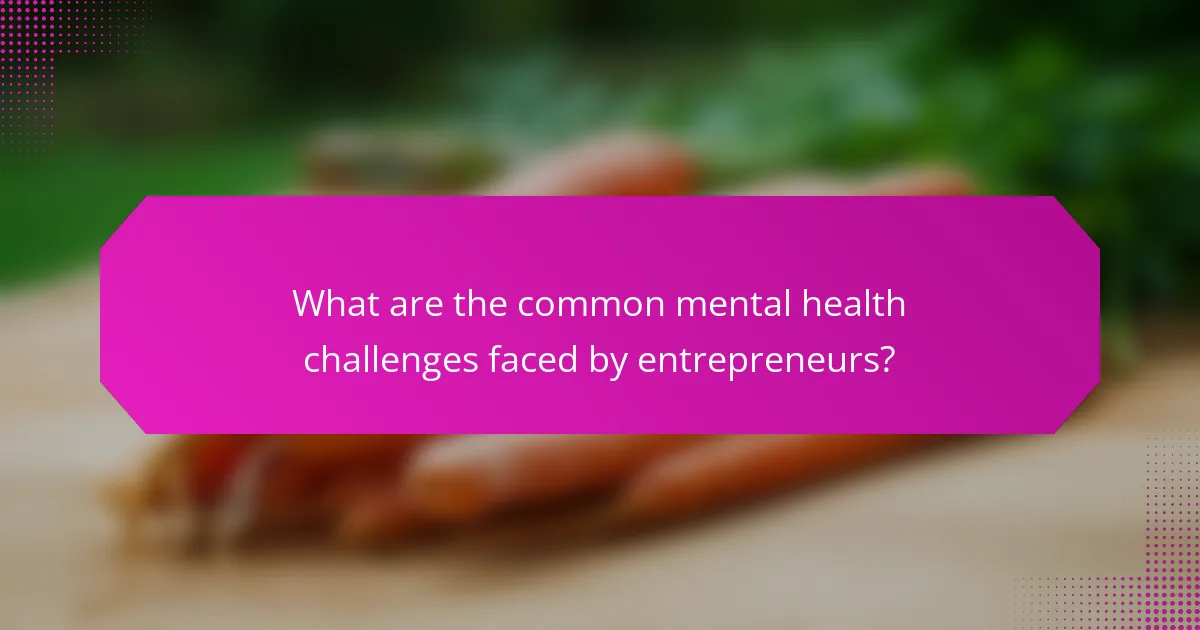
What are the common mental health challenges faced by entrepreneurs?
Entrepreneurs commonly face mental health challenges such as stress, anxiety, and isolation. These issues stem from the pressures of business ownership, including financial uncertainties and workload demands.
Stress often arises from long hours and the need to make critical decisions. A study found that 72% of entrepreneurs report experiencing mental health issues, highlighting the prevalence of anxiety among business owners. Isolation can occur due to the demanding nature of entrepreneurship, leading to a lack of social support.
Addressing these challenges requires proactive strategies. Entrepreneurs can benefit from seeking professional help, building a support network, and practising self-care routines. Prioritising mental health can enhance resilience and overall business performance.
How does stress impact business performance?
Stress negatively affects business performance by reducing productivity, impairing decision-making, and increasing absenteeism. Entrepreneurs often face unique mental health challenges, leading to heightened stress levels. High stress can result in decreased creativity and innovation, essential for business growth. Moreover, consistent stress may lead to burnout, further diminishing performance and jeopardising business sustainability. Addressing stress through effective coping strategies is crucial for maintaining optimal business operations and mental well-being.
What role does anxiety play in decision-making?
Anxiety significantly impairs decision-making by clouding judgment and increasing indecisiveness. Entrepreneurs often face heightened anxiety due to stress and isolation, which can lead to poor choices. Chronic anxiety may result in risk aversion, limiting opportunities for innovation and growth. Effective strategies to manage anxiety include mindfulness and structured decision-making processes, which can enhance clarity and confidence in business decisions.
How does isolation affect entrepreneurial well-being?
Isolation negatively impacts entrepreneurial well-being by increasing stress and anxiety levels. Entrepreneurs often face loneliness, which can lead to decreased motivation and productivity. Studies show that 72% of entrepreneurs experience mental health challenges, largely stemming from isolation. Building a supportive network can alleviate these feelings and enhance overall well-being.

What are the universal attributes of mental health challenges in entrepreneurship?
Entrepreneurs face universal mental health challenges, including stress, anxiety, and isolation. These challenges stem from the high demands of business ownership, creating a unique attribute of emotional burden. Stress often arises from financial pressures and decision-making responsibilities. Anxiety can be exacerbated by uncertainty in market conditions and personal performance. Isolation is a rare attribute, as entrepreneurs frequently work alone, lacking support systems. Addressing these challenges is crucial for sustainable business success.
What are the signs of burnout in business owners?
Burnout in business owners manifests through physical and emotional exhaustion, decreased performance, and feelings of detachment. Key signs include chronic fatigue, irritability, lack of motivation, and difficulty concentrating. These symptoms can lead to serious mental health challenges, impacting overall business success. Addressing burnout early is crucial for maintaining entrepreneurs’ well-being and productivity.
How do financial pressures contribute to mental health issues?
Financial pressures significantly contribute to mental health issues among entrepreneurs by inducing chronic stress and anxiety. The constant demand for financial stability can lead to feelings of isolation and overwhelm, as entrepreneurs often work alone. According to a study, 72% of entrepreneurs report mental health challenges due to financial strain. This unique attribute highlights the need for support systems to mitigate these pressures. As a result, addressing financial concerns can improve overall mental well-being and business success.
What coping mechanisms are commonly adopted?
Entrepreneurs often adopt various coping mechanisms to manage mental health challenges. Common strategies include mindfulness practices, physical exercise, social support networks, time management techniques, and professional counselling. Each mechanism addresses stress, anxiety, and isolation uniquely, enhancing overall well-being.

What unique challenges do female entrepreneurs face regarding mental health?
Female entrepreneurs face unique challenges regarding mental health, including heightened stress, anxiety, and feelings of isolation. These challenges stem from societal expectations, lack of representation, and balancing personal and professional responsibilities. Research indicates that women entrepreneurs report higher levels of stress compared to their male counterparts, often due to the pressure to succeed in a male-dominated business environment. Additionally, the struggle for work-life balance can exacerbate anxiety, as women frequently juggle family obligations alongside business demands. Building supportive networks can help mitigate these challenges and improve mental well-being.
How does societal expectation influence their mental health?
Societal expectations significantly impact entrepreneurs’ mental health by heightening stress and feelings of isolation. The pressure to succeed and conform can lead to anxiety, as entrepreneurs often feel judged by peers and society. This expectation can create a unique attribute of heightened vulnerability, making it essential for entrepreneurs to develop coping strategies. For instance, seeking support networks can alleviate feelings of isolation. As a result, addressing societal pressures is crucial for maintaining mental well-being in business ownership.
What support networks are available for women in business?
Support networks for women in business include mentorship programmes, networking groups, and online communities. These resources help combat isolation and provide emotional support. Organisations like the National Association of Women Business Owners (NAWBO) and Women’s Business Enterprise National Council (WBENC) offer valuable connections. Additionally, local chambers of commerce often host events focused on women entrepreneurs, fostering collaboration and sharing experiences. Engaging with these networks can significantly reduce stress and anxiety associated with business ownership.

What rare mental health challenges might entrepreneurs experience?
Entrepreneurs may face rare mental health challenges such as impostor syndrome, perfectionism, and chronic stress. These issues can lead to feelings of inadequacy, excessive self-criticism, and burnout. Research indicates that over 60% of entrepreneurs experience mental health struggles, with unique challenges stemming from the pressures of business ownership. Addressing these rare attributes is crucial for maintaining overall well-being and business success.
How can identity crisis manifest in business ownership?
Identity crisis in business ownership often manifests as self-doubt and confusion about one’s role and purpose. Entrepreneurs may experience stress and anxiety when their personal identity becomes intertwined with their business success or failure. This can lead to isolation as they struggle to communicate their challenges, fearing judgment from peers or employees. Furthermore, a unique attribute of this crisis is the potential for burnout, stemming from the pressure to constantly perform and meet expectations. Addressing these mental health challenges is crucial for sustainable business growth and personal well-being.
What are the effects of imposter syndrome on entrepreneurs?
Imposter syndrome negatively impacts entrepreneurs by causing feelings of self-doubt and inadequacy. This mental health challenge can lead to increased stress and anxiety, making it difficult for entrepreneurs to make decisions or take risks. As a result, many may experience isolation, impacting their ability to network and seek support. Over time, these effects can hinder business growth and personal fulfilment.
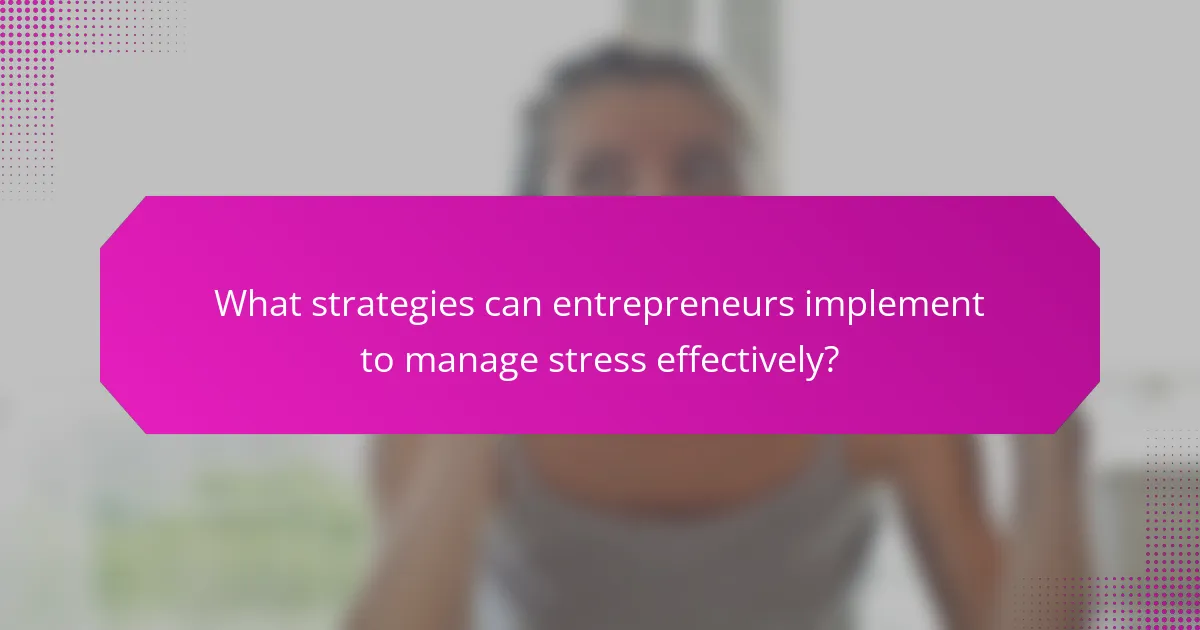
What strategies can entrepreneurs implement to manage stress effectively?
Entrepreneurs can manage stress effectively by implementing strategies such as time management, mindfulness practices, and seeking social support. Time management helps prioritise tasks, reducing overwhelm. Mindfulness practices, like meditation, enhance focus and emotional regulation. Seeking social support fosters connection, alleviating feelings of isolation.
What are the best practices for building a support network?
Building a support network is essential for entrepreneurs facing mental health challenges. Start by identifying like-minded individuals who understand your journey. Attend networking events, join online forums, and participate in local business groups. Establish regular check-ins with your network to share experiences and resources. Leverage social media to connect with mentors and peers who can offer guidance. Prioritise relationships that foster positivity and accountability, as they significantly reduce feelings of isolation.
How can mindfulness techniques be adapted for busy entrepreneurs?
Mindfulness techniques can be adapted for busy entrepreneurs by integrating short, focused practices into their daily routines. Techniques such as deep breathing, quick meditation, and mindful walking can be done in under five minutes, making them practical for tight schedules.
Incorporating mindfulness into regular activities, like during meetings or while commuting, enhances awareness and reduces stress. Entrepreneurs can also set reminders to pause and practice mindfulness throughout the day, creating a habit that promotes mental health.
Utilising mobile apps for guided mindfulness sessions can provide structure and accessibility, allowing entrepreneurs to engage with mindfulness on-the-go. This unique approach makes mental health management feasible amidst a hectic lifestyle.
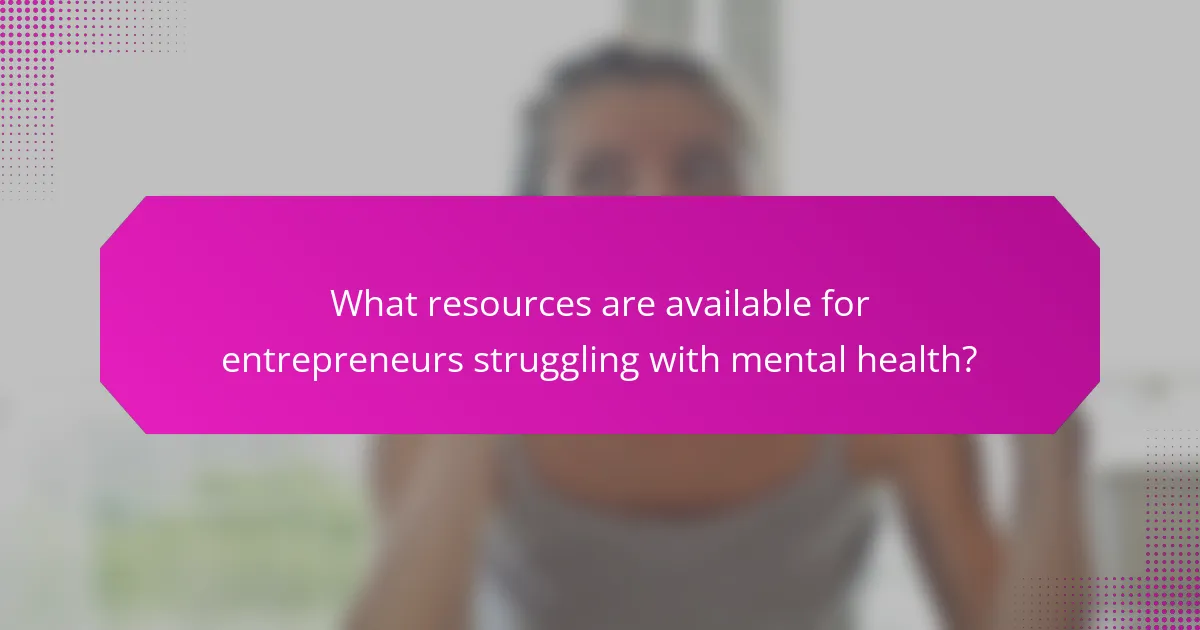
What resources are available for entrepreneurs struggling with mental health?
Entrepreneurs can access various resources to support mental health, including therapy, support groups, and online platforms. Professional counselling offers personalised strategies to manage stress and anxiety. Peer support groups provide shared experiences and community. Online resources, such as mental health apps, offer tools for mindfulness and coping techniques. Additionally, workshops focused on resilience and stress management equip entrepreneurs with practical skills.
What role do mental health professionals play in supporting business owners?
Mental health professionals provide essential support to business owners by addressing stress, anxiety, and feelings of isolation. They offer strategies for coping with the unique pressures of entrepreneurship, fostering resilience and emotional well-being. Through therapy and counselling, these professionals help entrepreneurs develop effective stress management techniques, build supportive networks, and enhance decision-making skills. This support can lead to improved business performance and personal fulfilment.
How can online communities provide assistance?
Online communities can provide significant assistance to entrepreneurs facing mental health challenges by fostering connection and support. These platforms offer a safe space where individuals can share experiences, seek advice, and reduce feelings of isolation.
Engagement in online forums can lead to valuable networking opportunities. Entrepreneurs can connect with peers who understand their struggles, creating a sense of belonging. This connection can mitigate stress and anxiety by providing emotional support and practical strategies for managing challenges.
Access to mental health resources is another critical benefit. Many online communities share articles, webinars, and expert insights that address mental well-being, equipping entrepreneurs with tools to cope with stressors. This shared knowledge can empower individuals to prioritise their mental health.
Lastly, accountability and encouragement from community members can motivate entrepreneurs to take proactive steps in managing their mental health. Regular check-ins and support can foster resilience, making it easier to navigate the complexities of business ownership.

How can entrepreneurs create a balanced work-life environment?
Entrepreneurs can create a balanced work-life environment by setting clear boundaries, prioritising self-care, and fostering social connections. Establishing a structured schedule helps manage time effectively. Incorporating regular breaks reduces stress and boosts productivity. Engaging with peers provides emotional support, combating feelings of isolation. Mindfulness practices enhance mental resilience, enabling better handling of anxiety.
What are the key elements of a healthy work-life balance?
A healthy work-life balance involves setting boundaries, prioritising self-care, and managing time effectively. Entrepreneurs face unique mental health challenges, including stress, anxiety, and isolation. To achieve balance, they should implement strategies such as delegating tasks, scheduling downtime, and seeking support from peers or professionals. These practices can enhance overall well-being and productivity.
What common mistakes should entrepreneurs avoid in managing their mental health?
Entrepreneurs should avoid neglecting self-care, isolating themselves, and failing to seek help. Prioritising mental health is essential for sustainable business success. Common mistakes include overworking, which leads to burnout, and not setting boundaries, causing stress and anxiety. Additionally, entrepreneurs often underestimate the importance of social support, which can exacerbate feelings of isolation. Recognising these pitfalls can lead to healthier management of mental health challenges.
What expert insights can help improve mental resilience in business ownership?
To improve mental resilience in business ownership, entrepreneurs can adopt strategies such as mindfulness practices, seeking mentorship, and establishing a strong support network. Mindfulness techniques reduce stress and enhance focus. Research shows that 60% of entrepreneurs experience anxiety; mentorship can provide guidance and emotional support. A reliable support network combats isolation, fostering collaboration and shared experiences. Regular physical activity and balanced nutrition also play crucial roles in maintaining mental health.
